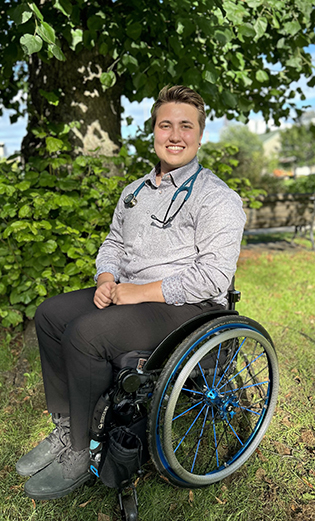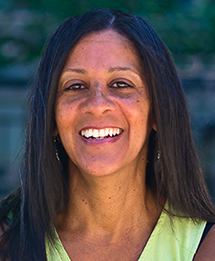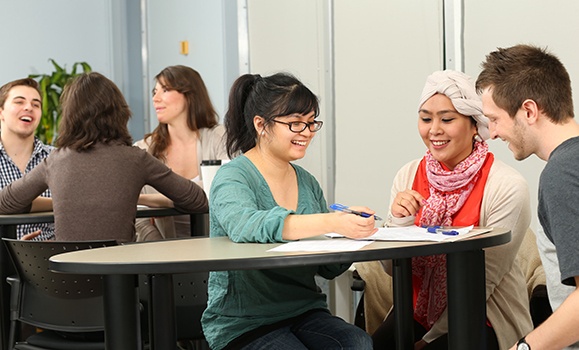Dalhousie University Introduces Leadership Academy to Enhance Students’ Skill Set
A unique program at Dalhousie is offering burgeoning student leaders the opportunity to hone their skills by partnering them with senior leaders at the university.
The Dal Student Leadership Academy, launched this winter, intends to help ensure future leaders like Dal Med student RJ Roggeveen are prepared to tackle some of the world’s most complex and urgent challenges.
 RJ, who graduated from Dal’s recreational therapy program last year, is halfway through his first year of medical school and serves as the school’s class of 2027 council co-president.
RJ, who graduated from Dal’s recreational therapy program last year, is halfway through his first year of medical school and serves as the school’s class of 2027 council co-president.
“Two and a half years ago I had an unfortunate injury that left me as a full-time wheelchair user,” says RJ. “I returned to my undergrad after taking a little bit of a break.”
“Now, a lot of my work on campus with different groups is very focused around accessibility and building advocacy,” says RJ.
RJ was encouraged by the dean in the Faculty of Medicine to apply to the inaugural cohort of the Student Leadership Academy’s high-performance tier, comprised of 20 highly engaged student leaders.
“I find that I am involved in leadership roles on campus at times, but I haven’t really ever stepped back and kind of reflected on those experiences and how to make those better,” says RJ. “I’m hoping this academy would allow me to take a step back and see what am I doing well, what am I not, and how can I do it better.”
Mentorship matters
RJ was attracted to the academy specifically because of the mentorship aspect and the opportunity to learn from a successful leader.
“Outside of the workshops, our mentor gets to work with us, and we create a capstone project with their guidance,” says RJ.
 Quenta Adams, assistant vice provost for student engagement and success (shown left), is one of those leaders serving as a mentor for students. Adams is also on the Academy’s advisory committee.
Quenta Adams, assistant vice provost for student engagement and success (shown left), is one of those leaders serving as a mentor for students. Adams is also on the Academy’s advisory committee.
“The Academy, specifically the high performance leadership tier, is grounded in the Inner Development Goals framework and the Five Practices of Exemplary Leadership,” says Adams who facilitated the first of five workshops, which focused on exploring leadership frameworks and the participant’s strengths and goals.
Kareina Cadel, student experience manager at Dal, says that the academy will ultimately offer three different tiers for students with varying leadership backgrounds. While the high-performing leadership stream is designed for those already heavily involved in on-campus leadership, the other two tiers are open to those hoping to start developing their skills further.
“We want to not only give them opportunities to build their leadership skills in a hands on way in the program, but also encourage them to seek opportunities outside the program as well,” says Cadel.
“Perhaps most importantly, besides creating community and student engagement, the Academy will be built around high-impact, experiential learning principles,” says Adams.
This winter, in addition to the high-performing leadership stream, Dal is also offering the first tier of the academy — the Foundations of Leadership workshop series. The workshops deal with key skills like public speaking and emotional intelligence.
“Each workshop is designed for someone without a prior background in that topic,” says Cadel.
Building skills that last
Students who attend five of the workshops will ‘graduate’ from the Foundations of Leadership program and be eligible for the next tier, Leadership in Practice, which will launch next Fall and aims to help students better understand their strengths and goals in an experiential setting.
That experiential aspect is key to one of the program’s goals of setting students up for success after graduation.
“Because of our world-class education, our students, when they graduate, will be asked to solve some of the most complex problems whether locally, nationally, or globally,” says Adams. “They will have an opportunity to continue making meaningful change which we imagine participation in the Leadership Academy brings them closer to being that change-maker.”
“I think that by getting to actually look at my skills and develop those in a really positive way, I’ll be able to go into these expected leadership roles more prepared and able to actually make a larger impact than I would previously without having that self-reflection and mentorship,” says RJ.
For RJ, the Academy offers him the opportunity to apply these skills as he works to advocate for accessibility.
“I think by getting to do this project with my mentor, I’m going to build connections within the school and then also the community. I’m hoping as I go into my career, I can keep building on that work.”

